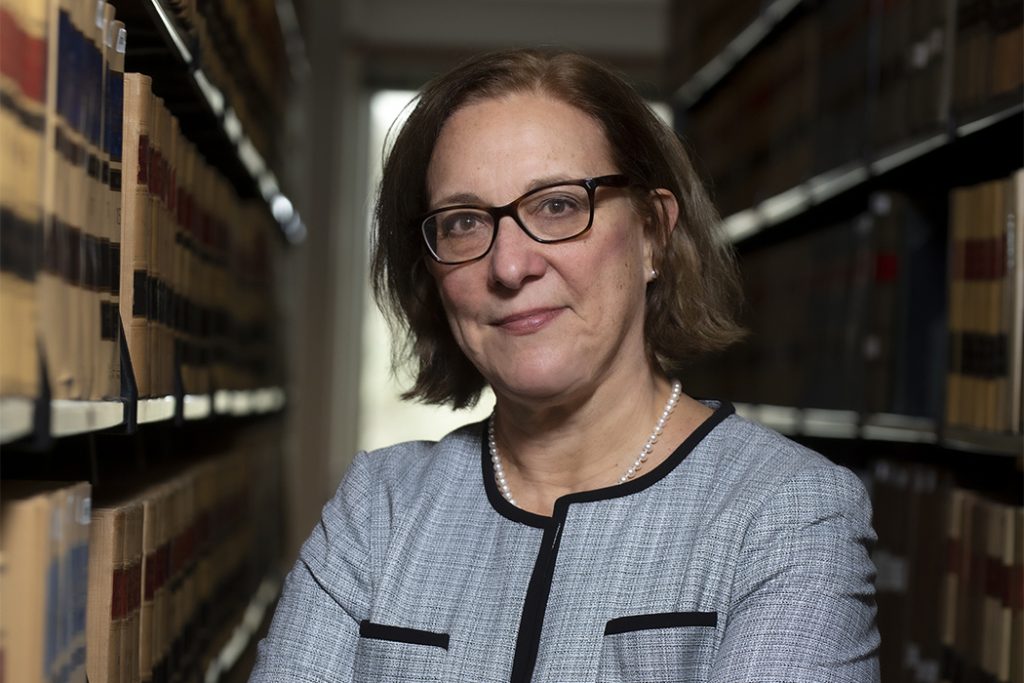An amicus brief co-authored by the Boston College Innocence Program (BCIP) contributed to an important victory for the wrongfully convicted in the state’s highest court last week. In Commonwealth v. Jenks, decided July 2, the Supreme Judicial reversed a Superior Court order denying, without a hearing, a motion for ballistics analysis brought by a man, Alfred Jenks, who maintains he was wrongfully convicted of first degree murder in 1996.
BCIP Director and Associate Clinical Professor Sharon Beckman, above, called the SJC’s interpretation of the state’s postconviction forensic testing statute, Mass General Law §278A, “an important ruling for defendants seeking scientific testing or forensic analysis relevant to their claims of factual innocence, especially those who are indigent and unrepresented by counsel.”
The amicus brief co-authored by BCIP and attorneys representing the Committee for Public Counsel Services, the Massachusetts Association of Criminal Defense Lawyers, and the New England Innocence Project, highlighted the case of BCIP’s exonerated client Ronnie Qualls as an example of the grave injustice done by courts that impose too high a filing burden on defendants seeking access to scientific testing material to their claims of factual innocence.
Qualls was wrongfully convicted of two counts of first degree murder and served 27 years in prison before he was exonerated by DNA testing in 2020.
In 2014, Qualls filed a pro se motion for appointment of counsel to assist him in preparing a Chapter 278A motion for forensic testing of physical evidence in his case. The same judge who presided over the trial in which Qualls was convicted denied his motion without a hearing finding nothing “that would suggest there would be any basis or merit to a chapter 278A petition.”
Five years later, Qualls—then represented by BCIP—filed a joint chapter 278A motion with the Commonwealth seeking DNA testing of physical evidence in his case. A different Superior Court judge granted the motion and subsequently vacated Qualls’s convictions based on the DNA testing results.
BCIP and the other amici argued that “Qualls’s eventual exoneration fulfilled the promise of Chapter 278A, but the extra years he spent in prison for crimes he did not commit … is a sobering reminder of why the [Massachusetts] Legislature imposed only a minimal burden of production of defendants seeking a Chapter 278A hearing” to prove their factual innocence.
BCIP’s work on the amicus brief was led by Clinical Legal Fellow Sarah Carlow ’20 with support from Beckman and BC Innocence Clinic students Meghan Murphy ’22 and Maxwell Passas ’22. The Boston Bar Association also filed an amicus brief supporting Jenks, who is represented in the case by attorney Dennis M. Toomey.
This is the second case in which BCIP’s Carlow and Beckman have teamed up on an amicus brief successfully urging the SJC to interpret chapter 278A broadly to accomplish the legislature’s goals of expediting forensic testing that could free the wrongfully convicted. The SJC cited the prior case, Commonwealth v. Williams, in support of its ruling last week.
“This was a great opportunity to work collaboratively with our community partners to make the law a little bit better,” said Carlow. “I am optimistic that the SJC’s ruling will go a long way towards protecting others like Ronnie by helping innocent people get quick and easy access to the testing they desperately need.”
Photograph by Lee Pellegrini


